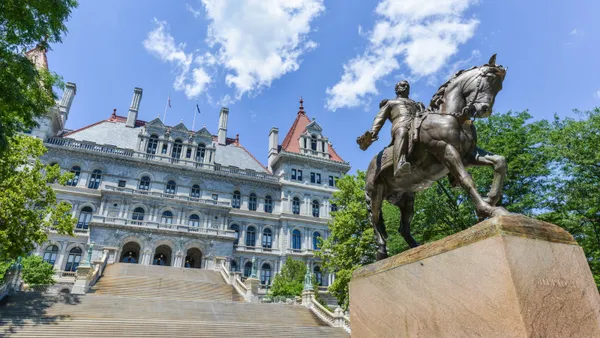Dive Brief:
- The U.S. Court of Appeals for the Ninth Circuit on Tuesday halted implementation of California’s Senate Bill 261, a law that requires business entities with revenues exceeding $500 million to publicly disclose their climate-related financial risks and countermeasures.
- The Nov. 18 decision came after the U.S. Chamber of Commerce and other business groups filed an emergency application with the U.S. Supreme Court last week. The Ninth Circuit initially denied a request for a preliminary injunction to pause both climate laws prior to their implementation and said it would hear the case next year. The emergency application, filed Friday, asked the nation’s top court to stop enforcement of both SB 261 and SB 253 pending the outcome of their appeal filed in the appellate court.
- Though the group requested for the implementation of both climate disclosure laws to be halted, the Ninth Circuit only granted the motion for injunction pending appeal to the enforcement of SB 261 and will allow enforcement of another climate disclosure law, SB 253, to proceed.
Dive Insight:
The federal appellate court provided no further reasoning behind its decision in its one-page order.
The U.S. Chamber of Commerce was joined by the California Chamber of Commerce, American Farm Bureau Federation, Los Angeles County Business Federation, Central Valley Business Federation and the Western Growers Association in its petition to pause both of California’s climate disclosure laws.
The U.S. Chamber applauded the Ninth Circuit’s decision to pause implementation of SB 261, calling the law “unconstitutional” in a Tuesday statement.
“We look forward to continuing our appeal and securing an injunction of both climate disclosure laws, which result in massive compliance costs for companies and their supply chains,” the business organization and lobbying group said. “One state should not have the ability to impose this kind of burden on the entire country.”
The decision came out as the California Air Resources Board, the agency tasked with enforcing the state’s climate disclosure rules, held a public workshop on Tuesday to support the development and enforcement of the rules.
Companies covered by SB 261, or the Climate-related Financial Risk Act, are expected to submit their reports on climate-related risks by Jan. 1, 2026. The law is part of the California Climate Accountability Package, which also includes SB 253, or the Climate Corporate Data Accountability Act.
SB 253 requires business entities operating in California with annual revenues exceeding $1 billion to annually report their greenhouse emissions. Entities covered by this law are expected to publicly disclose their scope 1 and 2 emissions to a reporting organization by June 30, 2026, and scope 3 emissions beginning 2027.
Both climate disclosure rules were signed into law in October 2023 by California Gov. Gavin Newsom.
In September, CARB issued a preliminary list of entities that may be subject to upcoming reporting requirements under either or both SB 253 and 261. The initial list included over 3,100 companies expected to be subject to the state’s climate disclosure laws.
The agency, however, noted the list may be incomplete and reiterated that potentially covered entities are responsible for complying with both climate laws, even if they are not mentioned in the preliminary list.













